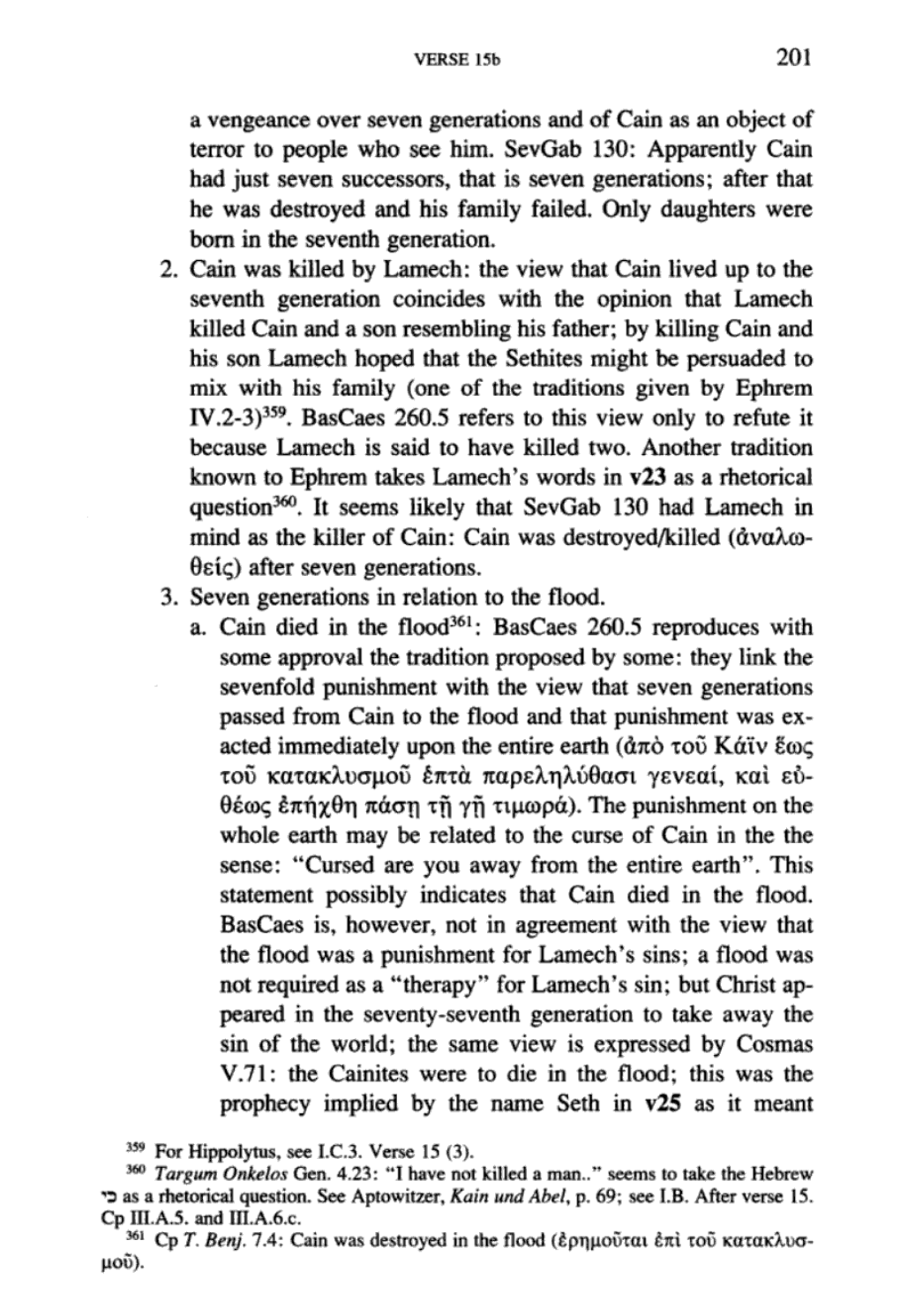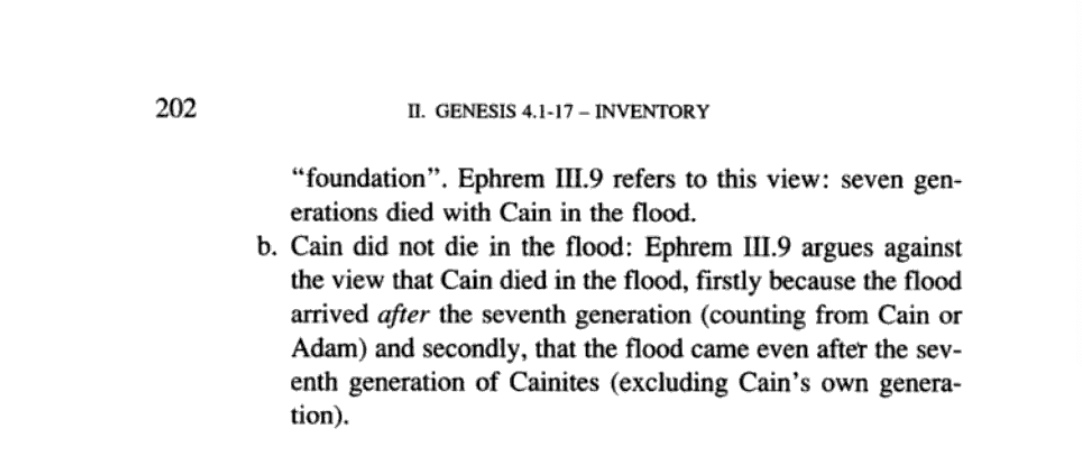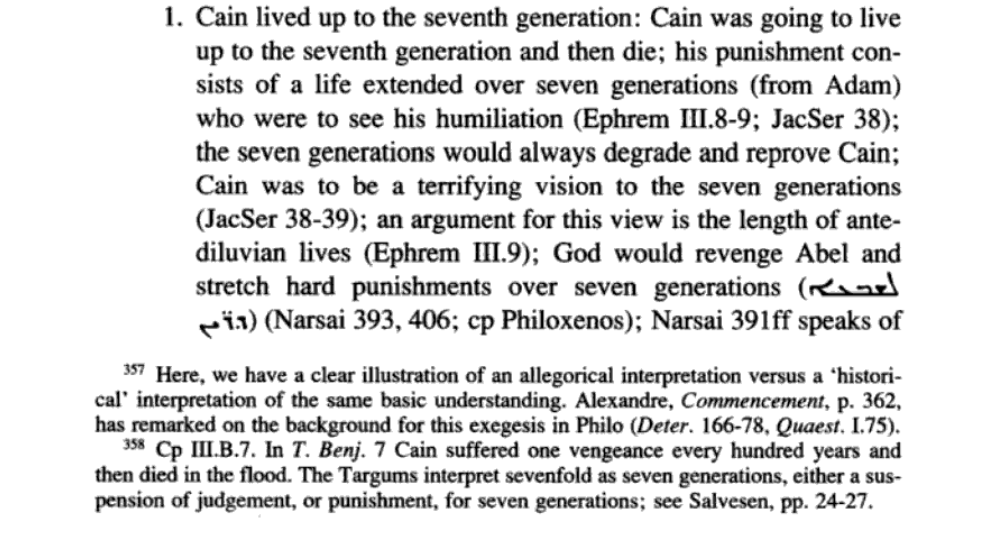Johannes Glenthøj gives an analysis of possible Cain deaths.
- Type
- Book
- Source
- Johannes Glenthøj Non-LDS
- Hearsay
- Secondary
- Reference
Johannes Bartholdy Glenthøj, Cain and Abel in Syriac and Greek Writers (4th-6th Centuries) (Lovanii: E. Peeters, 1997), 200
- Scribe/Publisher
- Johannes Glenthøj
- People
- Johannes Glenthøj
- Audience
- General Public
- Transcription
1. Cain lived up to the seventh generation: Cain was going to live up to the seventh generation and then die; his punishment consists of a life extended over seven generations (from Adam) who were to see his humiliation (Ephrem III.8-9; JacSer 38); the seven generation would always degrade and reprove Cain; Cain was to be a terrifying vision to the seven generations (JacSer 38-39); an argument for this view is the length of antediluvian lives (Ephrem III.9); God would revenge Abel and stretch hard punishments over seven generations (ܕܪܨ ܠܘܒܙܐ) (Narsai 393, 406; cp Philoxenos); Narsai 391ff speaks of a vengeance over seven generations and of Cain as an object of terror to people who see him. SevGab 130: Apparently Cain had just seven successors, that is seven generations; after that he was destroyed and his family failed. Only daughters were born in the seventh generation.
2. Cain was killed by Lamech: the view that Cain lived up to the seventh generation coincides with the opinion that Lamech killed Cain and a son resembling his father; by killing Cain and his son Lamech hoped that the Sethites might be persuaded to mix with his family (one of the traditions given by Ephrem IV.2-3)^359. BasCaes 260.5 refers to this view only to refute it because Lamech is said to have killed two. Another tradition known to Ephrem takes Lamech's words in v23 as a rhetorical question^360. It seems likely that SevGab 130 had Lamech in mind as the killer of Cain: Cain was destroyed/killed (ἀναλωθείς) after seven generations.
3. Seven generations in relation to the flood.
a. Cain died in the flood^361: BasCaes 260.5 reproduces with some approval the tradition proposed by some: they link the sevenfold punishment with the view that seven generations passed from Cain to the flood and that punishment was exacted immediately upon the entire earth (ἀπὸ τοῦ Κάϊν ἕως τοῦ κατακλυσμοῦ ἑπτὰ παρεληλύθασι γενεαί, καὶ εὐθέως ἐπήχθη πάση τῆ γῆ τιμωρά). The punishment on the whole earth may be related to the curse of Cain in the the sense: "Cursed are you away from the entire earth". This statement possibly indicates that Cain died in the flood. BasCaes is, however, not in agreement with the view that the flood was a punishment for Lamech's sins; but Christ appeared in the seventy-seventh generation to take away the sin of the world; the same view is expressed by Cosmas V.71: the Cainites were to die in the flood; this was the prophecy implied by the name Seth in v25 as it meant "foundation". Ephrem III.9 refers to this view: seven generations died with Cain in the flood.
b. Cain did not die in the flood: Ephrem III.9 argues against the view that Cain died in the flood, firstly because the flood arrived after the seventh generation (counting from Cain or Adam) and secondly, that the flood came even after the seventh generation of Cainites (excluding Cain's own generation).
The B. H. Roberts Foundation is not owned by, operated by, or affiliated with the Church of Jesus Christ of Latter-day Saints.



